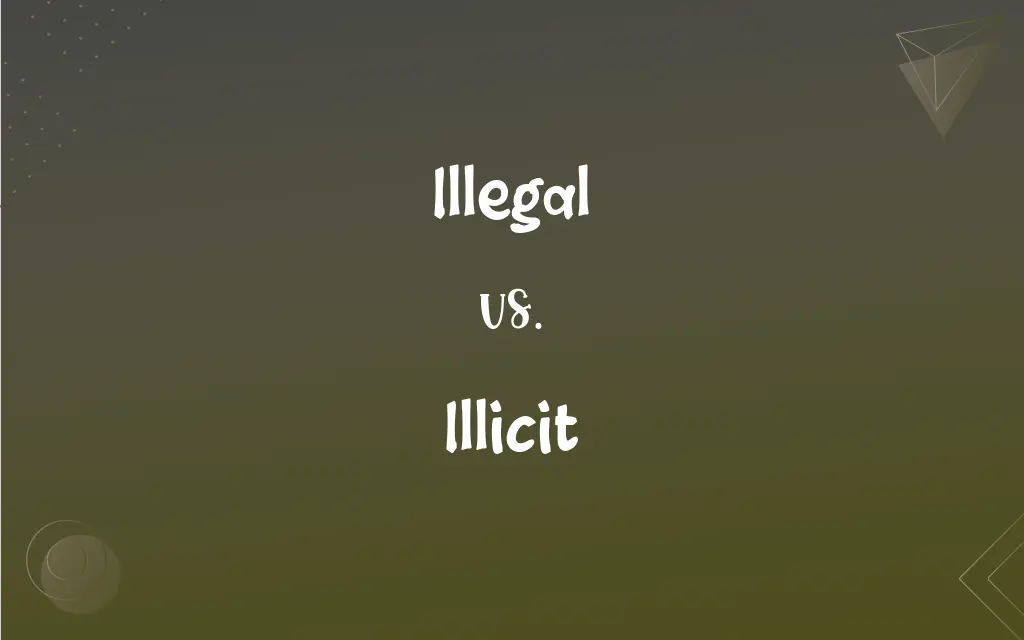Illegal vs. Illicit: What's the Difference?
Edited by Aimie Carlson || By Janet White || Updated on October 7, 2023
Illegal pertains to a violation of statutory law, while illicit often refers to actions forbidden by social conventions or ethical rules.

Key Differences
Illegal essentially relates to actions that are against the law, meaning they are forbidden by statute and are punishable by law. Illicit, conversely, denotes something that is not permitted or is considered improper by certain standards or social norms. Although they can often be used interchangeably, their nuanced differences are essential.
Illegal actions involve a direct violation of specific laws or regulations within a governed entity. Illicit activities, while also implying prohibitive actions, may not always infringe upon written laws but may contradict societal or organizational norms and expectations. It's a subtle distinction but a noteworthy one.
Illegal can refer to actions that contravene civil or criminal law, meaning that the infractions could pertain to private wrongs or public wrongs. Illicit carries a tone of being immoral or unethical in a generalized sense, not strictly adhering to legal codification but to a broader sense of propriety and acceptability.
The term illegal is often utilized in a broader scope, referring to anything that is against the law, such as illegal parking or illegal downloading. Illicit, however, often alludes to activities that are seen as secretive, unauthorized, or morally questionable, such as illicit affairs or illicit drug trade.
Sometimes, an action can be both illegal and illicit, meaning it violates both formal laws and ethical or societal norms. However, the demarcation usually lies in the specificity and jurisdiction of formal law (illegal) versus the generalized impropriety or unacceptability in a societal or ethical context (illicit).
ADVERTISEMENT
Comparison Chart
Definition
Prohibited by law.
Forbidden by accepted standards.
Connotation
Direct violation of statutory laws.
Engaging in socially or morally unacceptable practices.
Applicability
Pertains to civil and criminal law.
May not be legally defined but ethically/morally banned.
Example Usage
Illegal drugs (violating specific legal statutes).
Illicit love affair (morally frowned upon, not illegal).
Associated Domains
Often used in legal contexts.
Commonly used in moral and social contexts.
ADVERTISEMENT
Illegal and Illicit Definitions
Illegal
Not authorized by the official rules or laws.
An illegal turn on a red light can result in a traffic ticket.
Illicit
Unlawful; not permitted.
Illicit sales of antiquities damage cultural heritage.
Illegal
Not allowed by the law.
Parking in front of a fire hydrant is illegal.
Illicit
Forbidden by law, rules, or custom.
He was arrested for illicit drug use.
Illegal
Contrary to rules or laws.
Selling alcohol to minors is illegal.
Illicit
Not sanctioned by custom or law.
The illicit trade of wildlife parts threatens many species with extinction.
Illegal
Prohibited by official law or statute.
Creating illegal copies of official documents is a criminal act.
Illicit
Not allowed or prohibited.
Illicit activities, like smuggling, often occur across borders.
Illegal
Unlawful; violating legal codes.
Illegal downloading of software deprives creators of their due earnings.
Illicit
Not sanctioned by custom or law; improper or unlawful.
Illegal
Prohibited by law.
Illicit
(Linguistics) Improperly formed; ungrammatical.
Illegal
Prohibited by official rules
An illegal pass in football.
Illicit
(legal) Not approved by law, but not invalid.
The bigamous marriage, while illicit, was not invalid.
Illegal
Unacceptable to or not performable by a computer
An illegal operation.
Illicit
Breaking social norms.
Illegal
A person who is not legally authorized to live and work in a country.
Illicit
Unlawful.
Illegal
Contrary to or forbidden by law, especially criminal law.
This is illegal, you know!
Nearly 40 million people live in UK areas with illegal air pollution
Their illegal mining operations in Asia, Africa and elsewhere, are protected by officials and police paid to look the other way – and powerful customers in the construction industry who prefer not to ask too many questions.
Illicit
A banned or unlawful item.
Illegal
Breaching certain enacted statutes of positive law; not lawful, not legal (cf. immoral, unethical)
Illicit
Not permitted or allowed; prohibited; unlawful; as, illicit trade; illicit intercourse; illicit pleasure.
One illicit . . . transaction always leads to another.
Illegal
Forbidden by established rules.
Moving a pawn backward is an illegal move in chess.
Illicit
Contrary to accepted morality (especially sexual morality) or convention;
An illicit association with his secretary
Illegal
Totally fictitious, and often issued on behalf of a non-existent territory or country.
Illicit
Contrary to or forbidden by law;
An illegitimate seizure of power
Illicit trade
An outlaw strike
Unlawful measures
Illegal
Being or doing something illegally.
Illegal immigrant
Illegal logger
Illegal pilot
Illicit
Contrary to accepted morality or convention.
Illicit relationships can cause social scandals.
Illegal
Being an illegal immigrant; residing in a country illegally.
Illegal
(obsolete) An illegal act or technique.
Illegal
Contraband, esp. illegal substances such as drugs.
Illegal
An illegal immigrant.
Illegal
(espionage) A spy working abroad illegally and undercover, without visible ties to his or her country’s authorities.
Illegal
Not according to, or authorized by, law; specif., contrary to, or in violation of, human law; unlawful; illicit; hence, immoral; as, an illegal act; illegal trade; illegal love.
Illegal
Prohibited by law or by official or accepted rules;
An illegal chess move
FAQs
Is everything illegal also immoral?
Not necessarily; something might be illegal but not deemed immoral, as legality and morality can diverge.
Does "illegal" pertain only to criminal law?
No, “illegal” can refer to violations of both criminal and civil law.
Is an illegal act always punishable by law?
Typically yes, illegal acts are subject to legal penalties, which vary depending on jurisdiction and nature of the act.
Can a rule be illegal?
Yes, if a rule contravenes existing law, it might be considered illegal.
Are illegal things always illicit?
Not necessarily; “illegal” is specific to law, while “illicit” often concerns moral or societal norms.
Can “illegal” describe a person?
While used, describing a person as “illegal” is considered incorrect and dehumanizing; “undocumented” is preferred.
Are all actions against the law termed as illegal?
Yes, actions contrary to statutory law are typically termed illegal.
Can I use "unlawful" as a synonym for illegal?
Often, yes; "unlawful" and "illegal" are generally used interchangeably.
Can something be illegal but ethically right?
Yes, in some instances, an act may be illegal but considered ethically justifiable in certain moral frameworks.
Is illicit always associated with immorality?
Often, but not always; “illicit” usually denotes actions deemed immoral or inappropriate, not just illegal.
What does illegal mean?
Illegal refers to something prohibited by law.
What’s the definition of illicit?
Illicit describes something forbidden by law, rules, or social norms.
Can an illicit act be legal?
Potentially, yes; if an act is socially or morally frowned upon but not lawfully prohibited, it’s illicit but legal.
Can a relationship be illicit?
Yes; if a relationship violates social, moral, or sometimes legal boundaries, it might be described as illicit.
Is “illicit” always negative?
Generally, yes; “illicit” typically carries a negative connotation, implying improper actions or qualities.
Is illicit behavior always harmful?
Not inherently, but illicit behavior often involves actions that are deemed harmful or undesirable by legal, social, or moral standards.
Are “illicit” and “illegal” synonymous?
While often used interchangeably, they're not exact synonyms; “illegal” is law-specific, while “illicit” often pertains to moral/social unacceptability.
Can something be illicit in one culture but not in another?
Absolutely; what’s deemed illicit can greatly vary between different cultures or societies.
Is illicit activity always secretive?
Often, yes; due to its prohibited or frowned-upon nature, illicit activity is commonly conducted secretly.
Can an object be illicit?
Yes; objects involved in or resulting from activities that are illegal or socially frowned upon (like illicit drugs) are often termed as illicit.
About Author
Written by
Janet WhiteJanet White has been an esteemed writer and blogger for Difference Wiki. Holding a Master's degree in Science and Medical Journalism from the prestigious Boston University, she has consistently demonstrated her expertise and passion for her field. When she's not immersed in her work, Janet relishes her time exercising, delving into a good book, and cherishing moments with friends and family.
Edited by
Aimie CarlsonAimie Carlson, holding a master's degree in English literature, is a fervent English language enthusiast. She lends her writing talents to Difference Wiki, a prominent website that specializes in comparisons, offering readers insightful analyses that both captivate and inform.































































